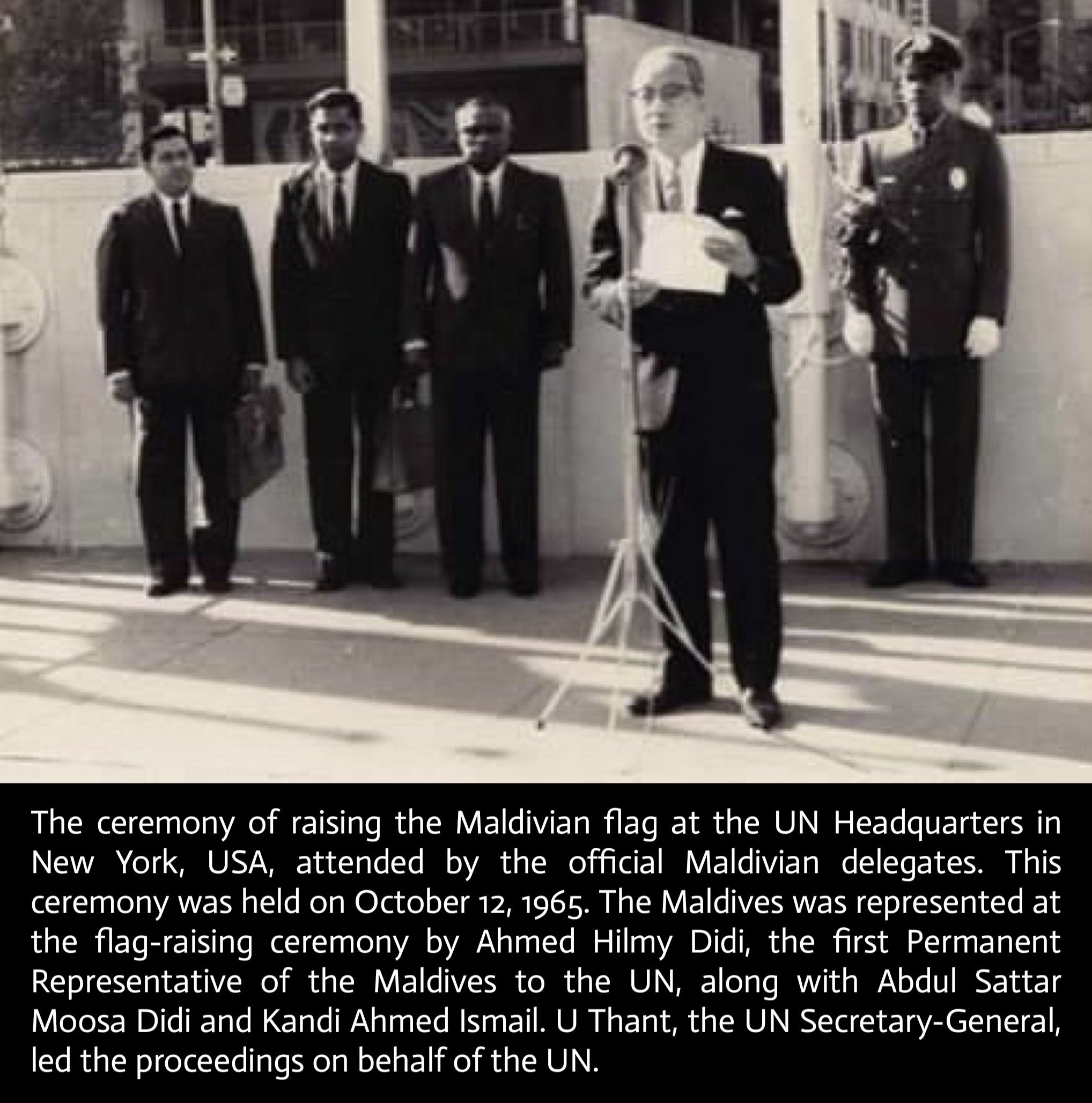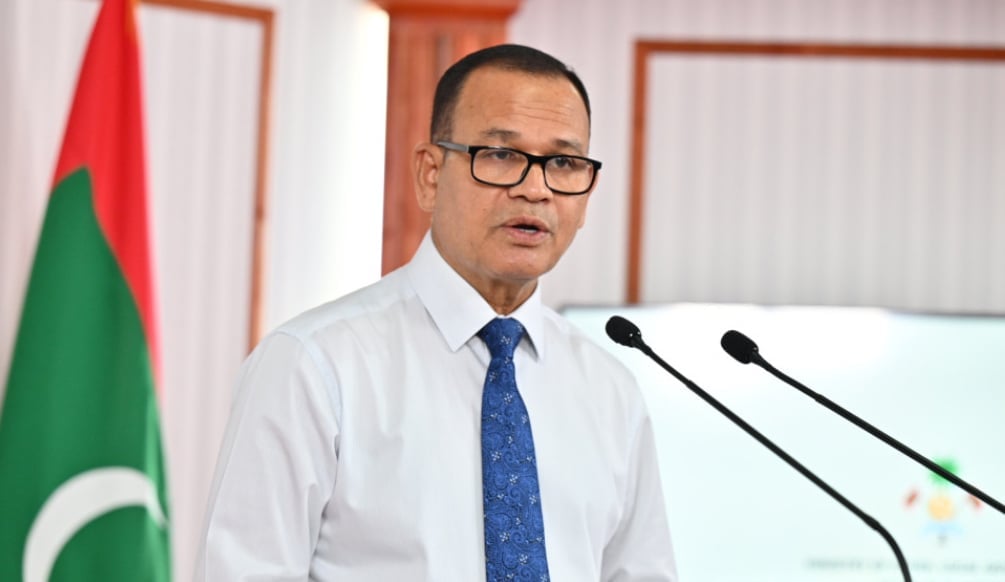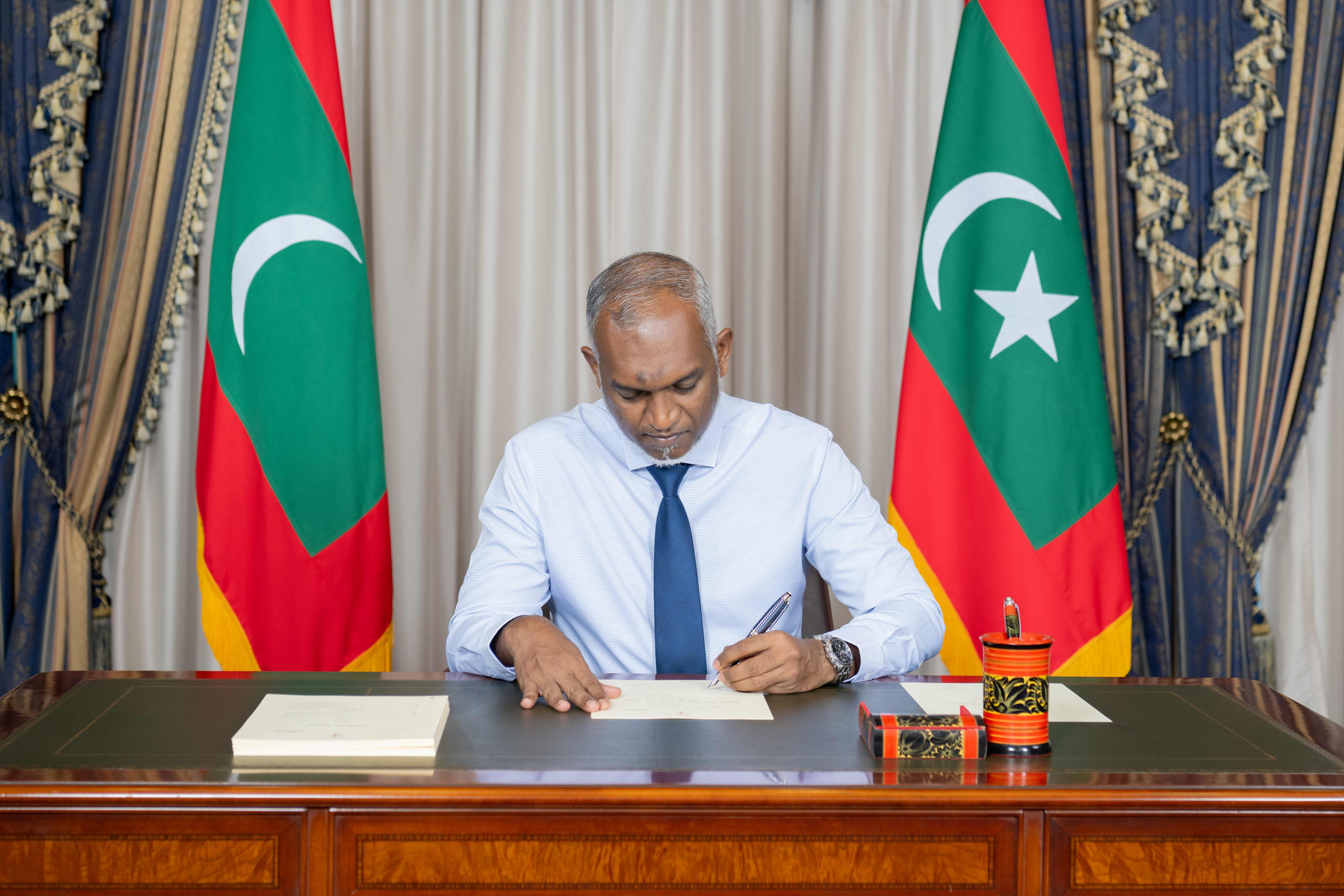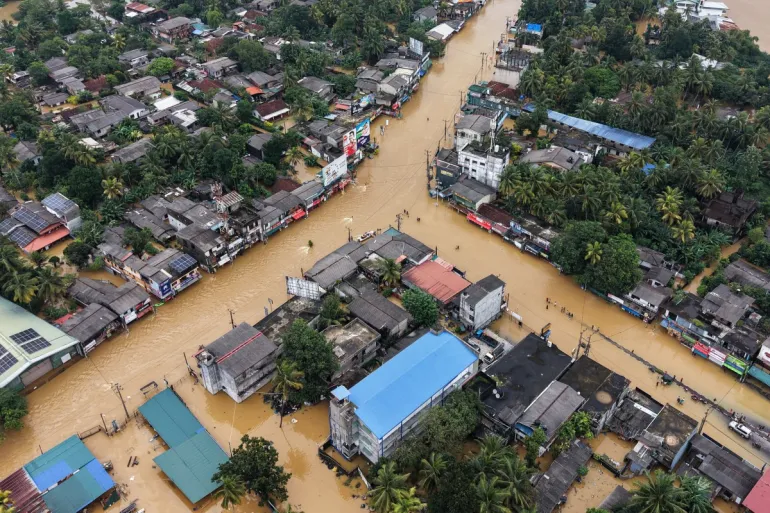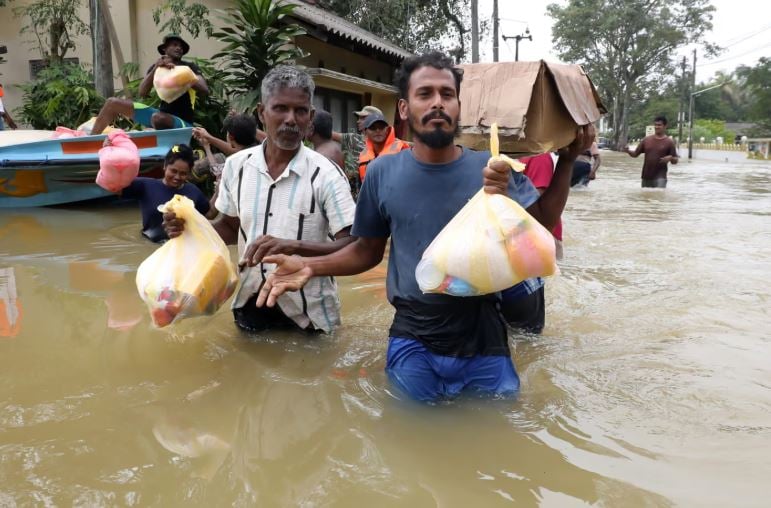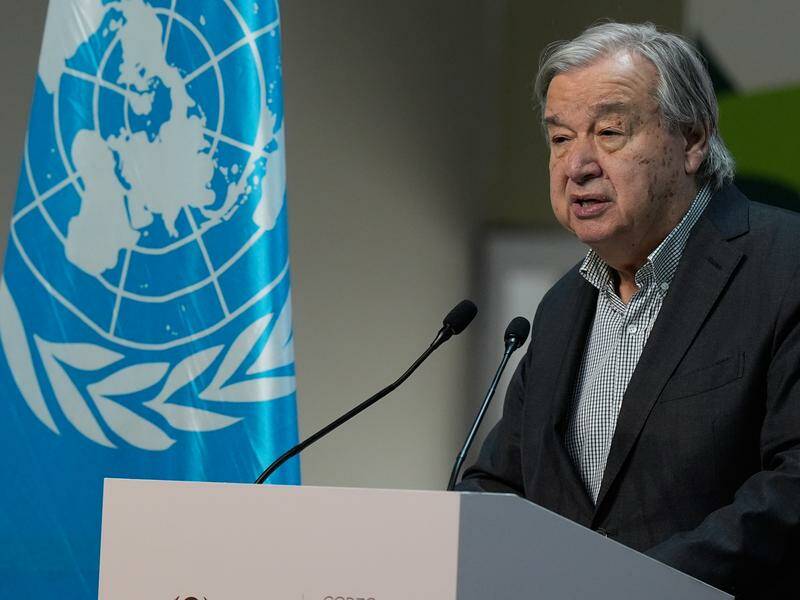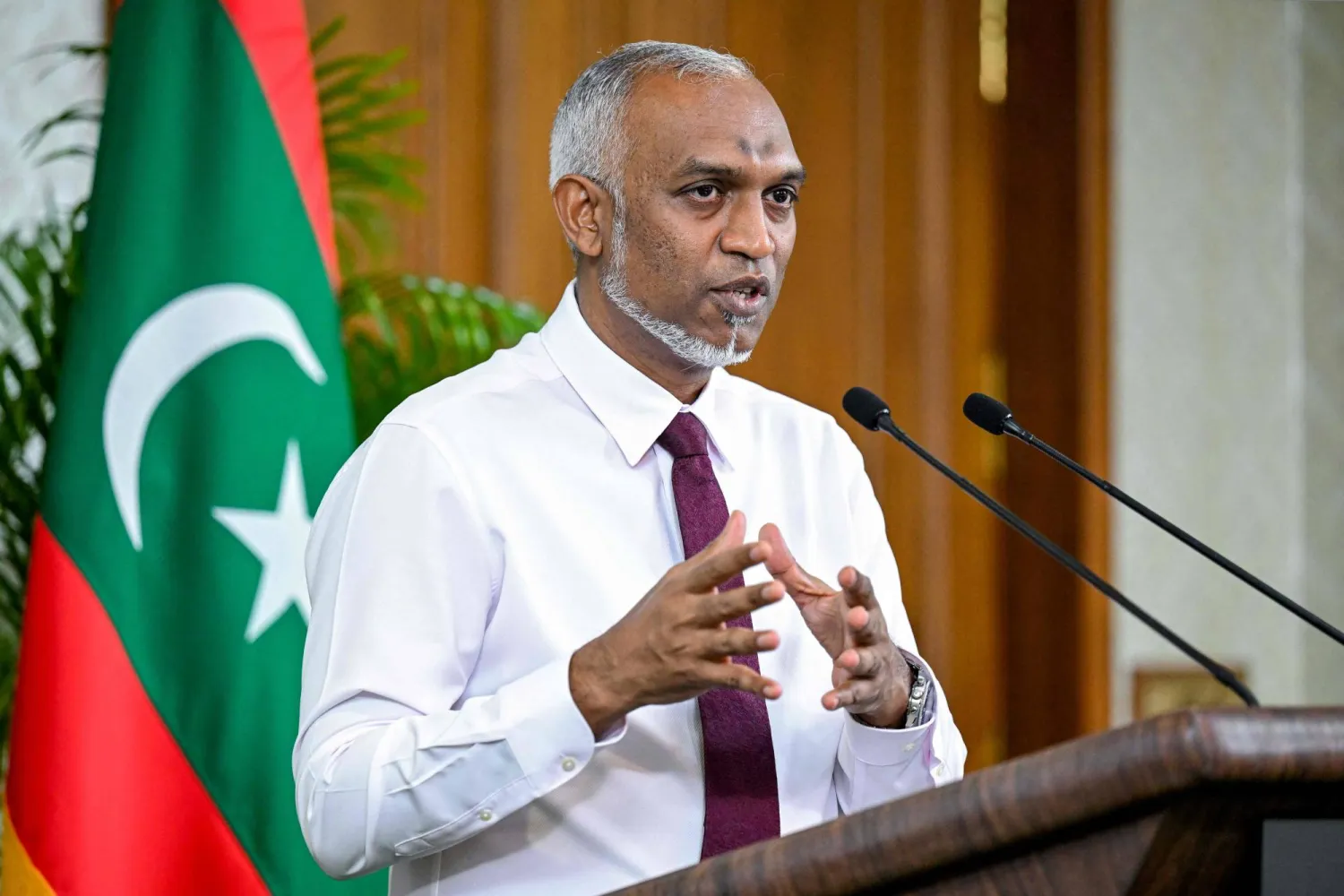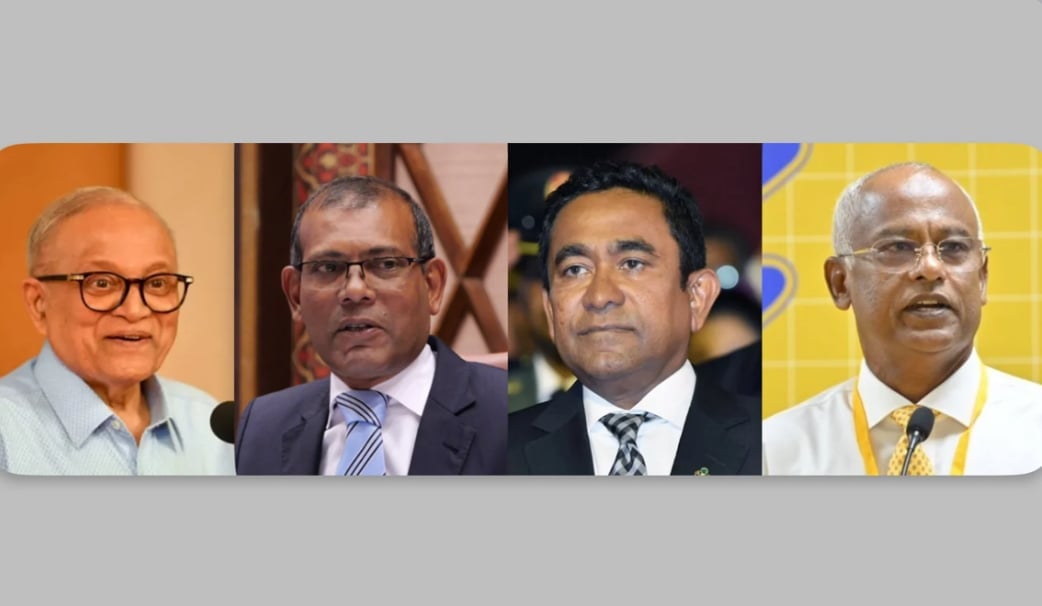The period after World War II, when the world's nations were reorganizing, was also a time of significant events in Maldivian history. As a result, the Maldives went through several stages before establishing itself as an independent nation on par with countries of varied sizes and stature around the world. From December 1887, the Maldivians had been officially paying a "tribute" to the British government in Ceylon. This, according to the Maldivians, was not a tribute, as it had previously been. It was a symbolic gift exchanged under the political relationship between the two countries. In other words, it was a gesture of goodwill. However, both the Britain and later Ceylon, after gaining independence on February 4, 1948, considered the Maldives as a "tributary" state that had been paying tribute to Ceylon since ancient times.
Maldivians have never accepted that the Maldives was a tributary state of Ceylon, nor was it ever the case. The tribute was an annual gift from the Maldives that had been given since Ceylon was under Dutch rule. Therefore, Mohamed Amin Didi, who was then in charge of the Maldivian government, decided to explain this misconception and fully halt the 'annual gift', which they deemed a "tribute," and establish the Maldives as an independent state. As a result, the British-Maldivian protection agreement was renewed. This event took place at Malé on April 24, 1948. The main purpose for stopping the annual gift was to clear up any confusion that had arisen, more for Ceylon than the British. And also, to prevent Ceylon from later claiming sovereignty over the Maldives. However, as I mentioned earlier, the Ceylonese continued to believe as previously stated. Evidence of this is that on March 8, 1957, Ceylon's Prime Minister Solomon Bandaranaike made a claim on the Maldives. In this claim, he also indicated that he would consult with the British to bring Ceylon's sovereign power over the Maldives. This story was also published in some newspapers at the time. Therefore, the treaty made on April 24, 1948, during the rule of Mohamed Amin Didi, was a very important step taken for the Maldives to exist as an independent sovereign state in the modern world.
Subsequently, on July 26, 1965, during the reign of Sultan Mohamed Fareed, Prime Minister Ibrahim Nasir's most significant achievement was transforming the country into a fully independent and sovereign nation, free from British protection. Although the independence agreement was signed on July 26, 1965, it is certain that this was the result of numerous efforts made long before. After emerging as an independent nation, the next major step taken to ensure the continuity of that independence was joining the United Nations, the largest international organization created for peace, friendship, and development among all countries of the world. On August 26, 1965, one month after independence, Prime Minister Ibrahim Nasir signed and sent a letter to the UN Secretary-General requesting membership in the United Nations. Along with this letter, he also submitted a document pledging to fully comply with the obligations of member states as per the UN Charter.
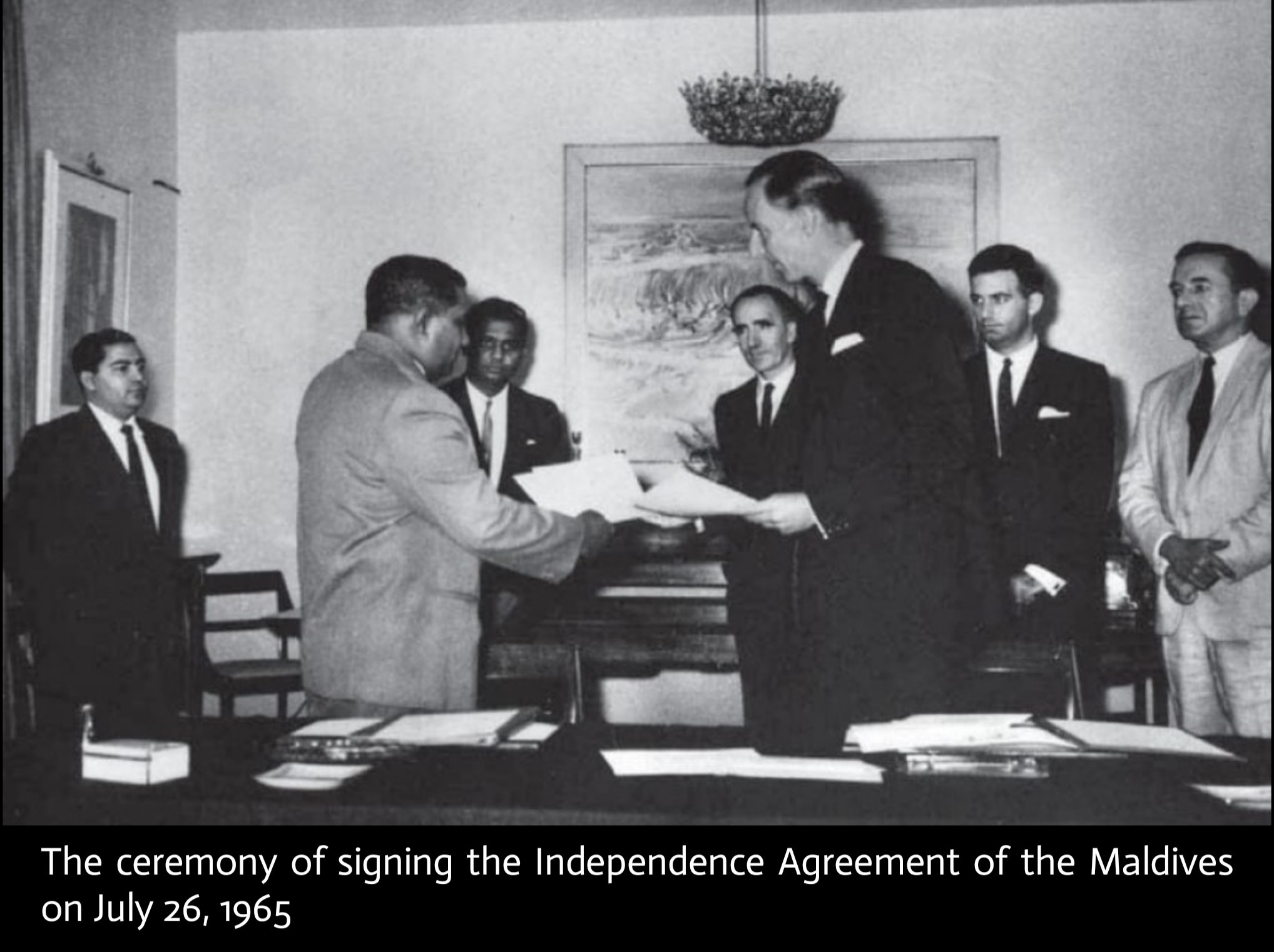
In connection with the letter sent by the Maldives requesting membership in the UN, the matter was placed on the agenda of the 1243rd meeting of the Security Council held on September 20, 1965, and discussions were held that day. On that day's agenda was also the issue of granting membership to Singapore, which is slightly larger than the Maldives but still considered among the small nations. At that time, the Maldives was the smallest country in all aspects that had applied for UN membership, referring to both population and land area. Three countries sponsored and submitted a resolution for the Maldivian application to join the UN. These were Jordan, Malaysia, and the United Kingdom.
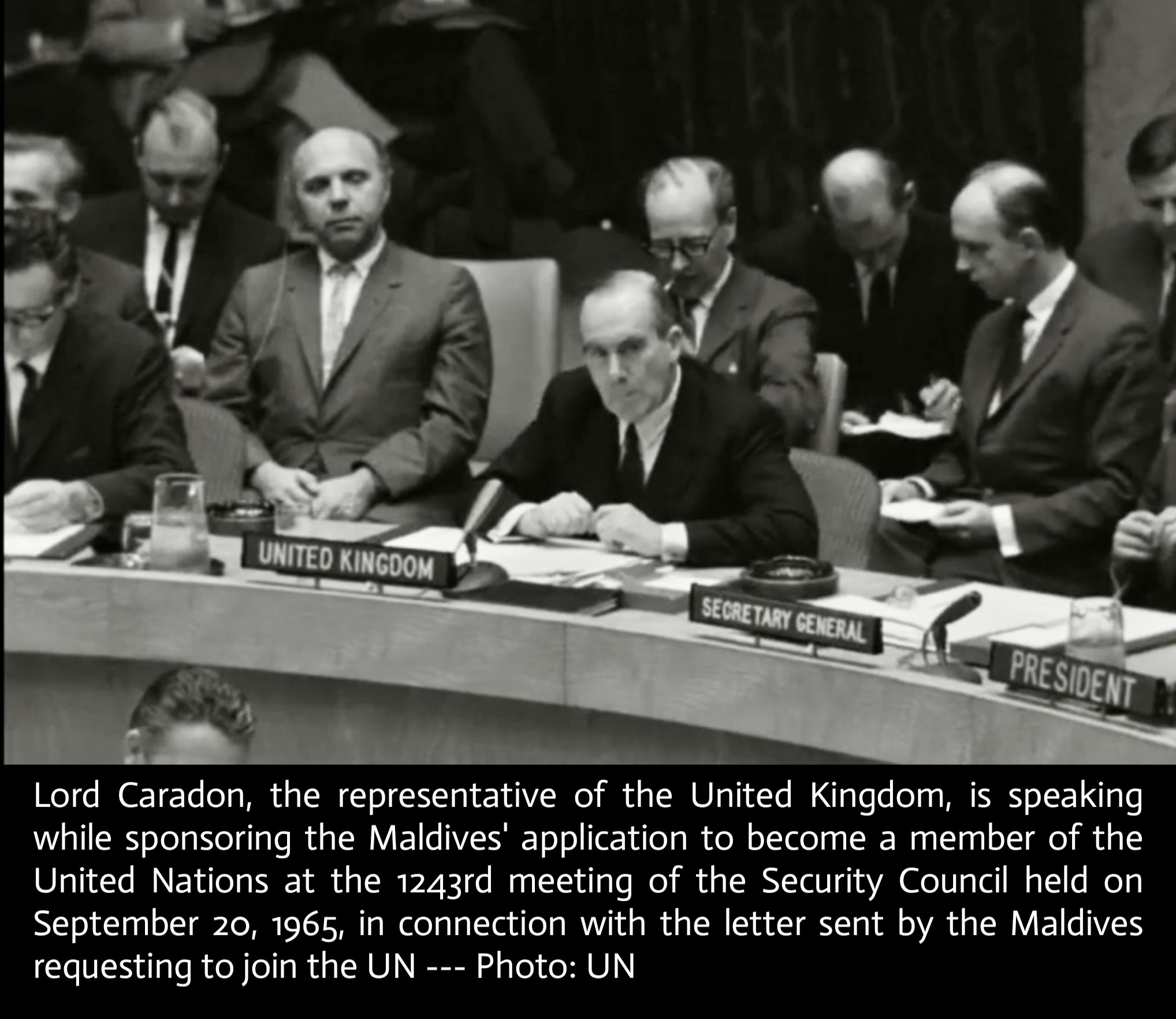
In his speech that day, Lord CARADON, the British representative said:
"My country has had relations with the inhabitants of the Maldive Islands since the seventeenth century, and I am very glad today to sponsor the application of the new State of the Maldive Islands for membership in the United Nations. The population of the islands is just short of 100 000 people, and the widely scattered islands in the past have usually been remote from the main currents of world events. But, comparatively small in population and in total area as the Maldives are, the application now before us could not be supported by better qualifications.
The people of the Maldives are lovers of freedom who enjoy a democratic form of government. Their Sultanate, which is elective, dates from the twelfth century, when they were converted to Islam, and the island chronicles go back to 1141. Their Majlis is a parliament in which the inhabitants of all the islands are freely represented.
The long and close association between my country and the Maldives led to the final step in the development of those relations in an agreement concluded between the two Governments at Colombo, on 26 July 1965, under which my Government confirmed its recognition of the State of the Maldive Islands as a ‘composite sovereign and fully independent State possessing all rights to have direct relations politically and otherwise with all countries and international organizations.’
The relations of the Maldives with other States have been friendly, particularly with their nearest neighbour and chief trading partner, Ceylon, and as Moslems they have also maintained their links with the countries of Arabia.
On attaining full independence, the elected leaders of this new State, amongst their first acts, submitted the application of their State for admission to membership in the United Nations. This was the culmination of their aspirations and was accompanied by a declaration of their devotion to the principles of the Charter.
These are the qualifications - free government, full independence, friendly relations with all and a dedication to the aims and principles of the United Nations which justify the application before us, an application which, on behalf of my Government, I have the privilege to commend for your approval."
In his speech, the Jordanian representative Mr. SADI said:
"It is a great honour for my delegation to join the delegations of Malaysia and the United Kingdom in co-sponsoring a draft resolution recommending to the General Assembly that the Maldive Islands be admitted to membership in the United Nations, and also to join the delegations of the Ivory Coast, Malaysia and the United Kingdom in co-sponsoring another draft resolution recommending to the General Assembly that Singapore be admitted to membership in the United Nations.
My delegation considers it a privilege to be instrumental, even though in only & technical manner, in furthering universal representation in our inter- national Organization. It is always a sign of added strength and growth when the membership of the United Nations is on the rise.
While the Maldive Islands is relatively a small country in terms of population, it is indeed a great occasion to see its nationhood endorsed by membership in the United Nations. The people of my country share with the people of the Maldive Islands not only the same religion but a similar culture and language. It therefore gives my delegation particular pleasure today to have a part in the submission of the draft resolution so that our brethren may become Members of the United Nations in order that their voice may also be heard.
We feel certain that the General Assembly will unanimously approve the admission of these two nations. On behalf of my Government, I congratulate the two new nations on their forthcoming new status in our midst, and I pray that their participation in the United Nations will be crowned with productivity and success."
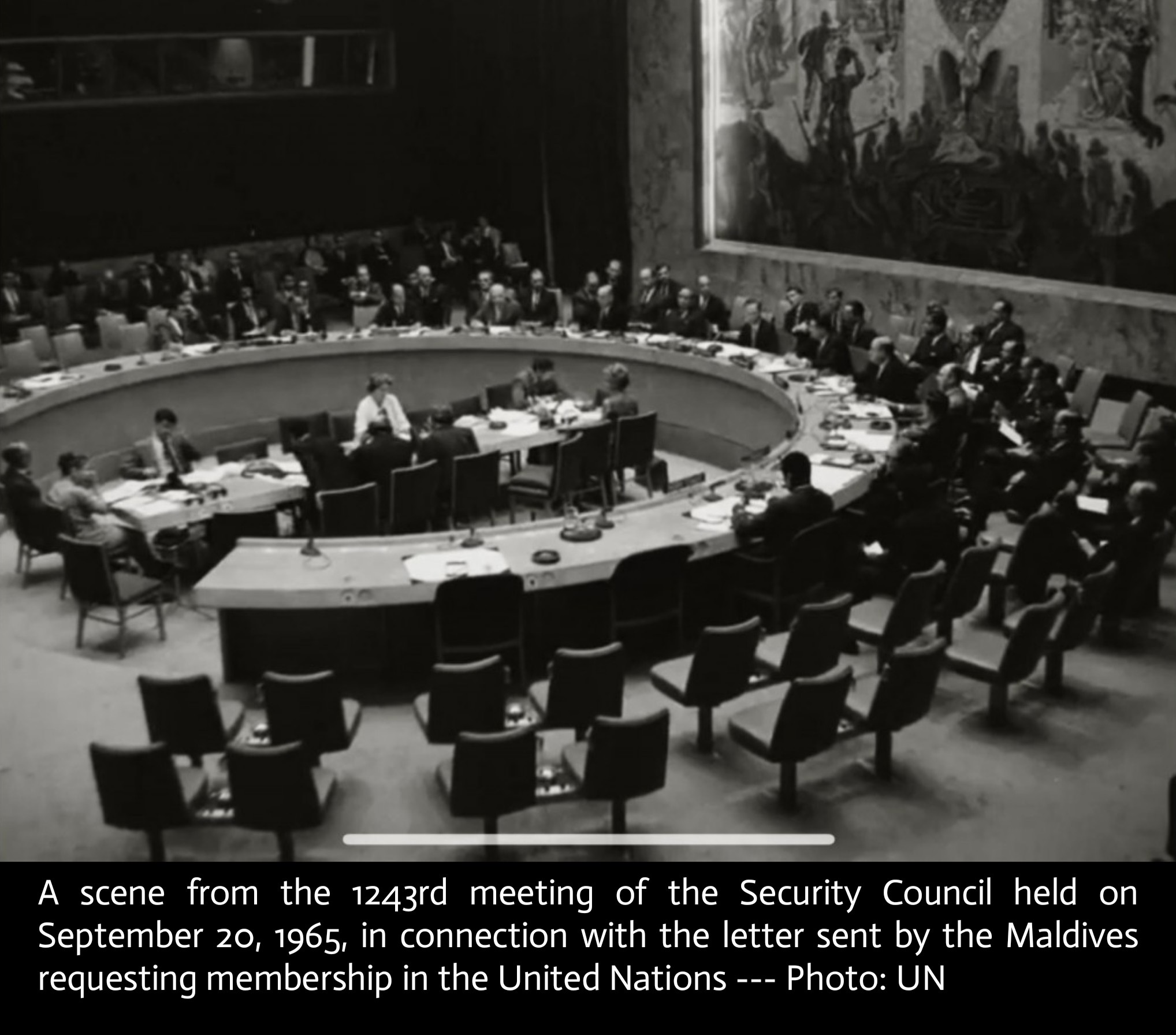
Mr. AKA, the Representative of the Ivory Coast said:
Among the pleasures and advantages attaching to membership of the Security Council, there are not only those of deliberating into the early hours on nights of tension, but also those of welcoming new States into the international community. The Ivory Coast, whose admission to the Security Council coincided with one of those rare moments when a large number of sovereign nations became independent, has already sponsored the admission of several States to the United Nations. It has always done so with enthusiasm and a sense of responsibility. It is a great pleasure for it to do so again in the case of Singapore and the Maldive Islands, whose applications the Security Council is called upon to consider today.
I believe that the smaller nations are, the more they need the United Nations. Consequently, Singapore and the Maldive Islands will naturally be bound, as Members of the United Nations, to co-operate with the Organization in bringing about the triumph of the ideals of peace and coexistence that we affirm and defend here."
Speaking at this Security Council meeting, the representative of the Republic of China (now Taiwan), Mr. HSUEH, said:
"The Security Council is today considering the applications for membership of two newly independent Asian countries. As an Asian country, China welcomes the applications of the Maldive Islands and Singapore. Though relatively small in land area and population, the two applicants are, in the view of my Government, fully qualified for membership in the United Nations. The Charter of the United Nations makes no distinction between countries, large and small. The very first principle of the Organization laid down in the Charter is the principle of the sovereign equality of all its Members.
The only conditions that govern the admission of new members are those set forth in Article 4 of the Charter. That Article limits membership to peace- loving States which accept the obligations contained in the Charter and are able and willing to carry out those obligations. In fact, these same conditions also govern the continuing membership of all present Members. In the view of my Government, both the Maldive Islands and Singapore meet these criteria.
The Maldive Islands are perhaps the smallest in size of all countries. This fact, however, has not made any weaker the will of the brave Maldive people to independence and freedom. Their early history contains a proud record of successful resistance against numerous attempts by outside forces to control them. Of their own free will, they once sought neighbourly protection from another country. And of their own free will, they have now achieved full independence. My Government already extended its warm congratulations and best wishes to the Maldive Government and people on that occasion.
Although limited in resources because of the size of their country, the Maldive people are known to be industrious. It is our hope and belief that they will continue to be successful in their work of nation- building and development. It is gratifying to know that the United Kingdom, with which the Maldive Islands have maintained close relations, has extended its helping hand in this regard. In admitting the Maldive Islands to its membership, the United Nations should also stand ready to be of assistance and to co-operate if the Maldive people so wish.
My delegation, therefore, has the honour, on behalf of the Chinese Government and people, to welcome both the Maldive Islands and Singapore to the United Nations. We wish them success as independent States and Members of the United Nations. Accordingly, my delegation will vote in favour of the draft resolutions recommending to the General Assembly that these States be admitted to member- ship in the United Nations.
Speaking at the UN Security Council meeting, Russian representative Mr. FEDERENKO said:
"The Security Council has before it today a declaration by the Prime Minister of the Maldive Islands, Mr. Ibrahim Nasir, applying for the admission of the Maldive Islands to membership in the United Nations, and a declaration by the Minister for Foreign Affairs of Singapore, Mr. S. Rajaratnam, applying for the admission of Singapore to membership in the United Nations.
In its declaration, which has been circulated to members of the Security Council, the Government of the Maldive Islands states that it accepts the obligations contained in the United Nations Charter and undertakes to fulfil them.
In welcoming the birth of a new independent State, the Soviet delegation expresses its satisfaction at the fact that on 26 July 1965 yet another dark page of colonial history was turned. On that day the courageous people of the Maldive Islands restored their country to freedom and political independence from foreign colonialist domination.
It is significant that the refreshing winds of liberation from colonial slavery have also begun to blow over small colonial territories with small populations. This demonstrates the glory and wisdom of the historic Declaration on the Granting of Independence to Colonial Countries and Peoples, the provisions of which are equally applicable to all colonial territories, both large and small, regardless of where they are situated in the world.
We know that freedom for the people of the Maldive Islands was not achieved at all easily. As in other cases, colonialism barred the way to its attainment. First there were the Portuguese colonialists who seized the Maldive Islands in the sixteenth century. Then the British "protectors" appeared on the Islands and were the arbiters of the Islands' fate for many decades.
These foreigners and their local henchmen kept the population of the Maldive Islands in darkness and ignorance for their own selfish ends. But ideas of national liberation continued to mature among the people. The glad tidings of victories over the colonialists in other countries reached the Islands' shores across the Indian Ocean and awakened thoughts of freedom in the minds of patriots.
However, it is clear that the political independence achieved by the Maldive Islands will not by itself eliminate all the problems or liquidate all the baneful consequences of colonialist domination. The people of the Maldive Islands, like all other peoples who have recently won their independence, are faced with the complex problems of liquidating the consequences of colonialism.
Political independence creates the conditions in which a people can itself decide the ways in which its country is to develop in the future.
On the day when the independence of the Maldive Islands was proclaimed, the Soviet Union sent greetings to this new State. The following is part of a cable from Mr. Kosygin, Chairman of the Council of Ministers of the USSR, to Mr. Ibrahim Nasir, Prime Minister of the Maldive Islands:
"On behalf of the people and Government of the Union of Soviet Socialist Republics, we congratulate the people and Government of the Maldive Islands, and you personally, on a significant event in the history of the Maldive people-the achievement of political independence. We wish the Maldive State every success in the consolidation of its independence."
The Soviet delegation also congratulates the Government and people of the Maldive Islands on attaining independence, supports the application of the Maldive Islands for admission to membership in the United Nations, and will vote in favour of recommending to the General Assembly that the Maldive Islands should be accepted as a Member of the United Nations."
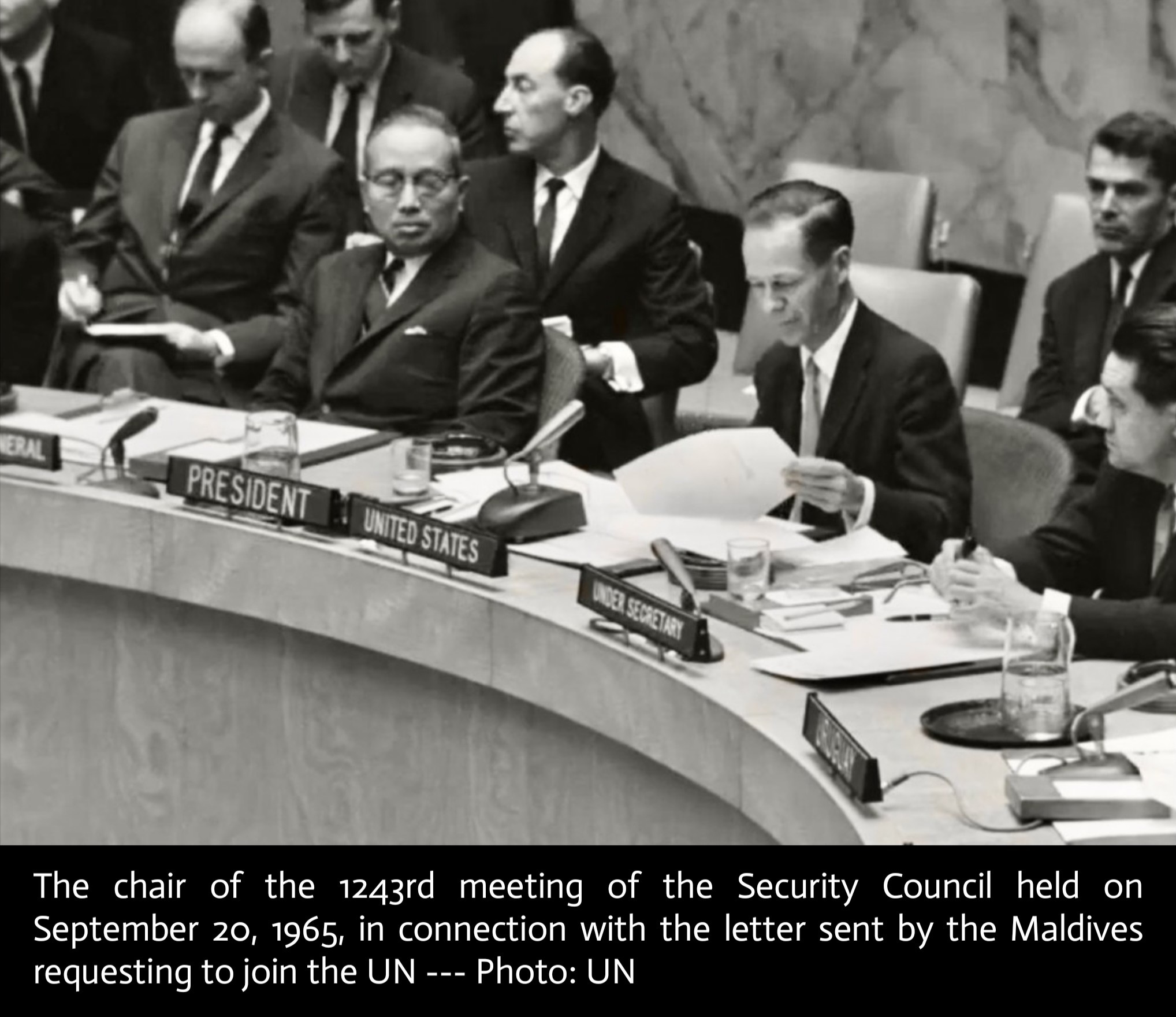
Mr. SEYDOUX, the French representative said:
"The Maldive Islands have likewise applied for admission to membership in the United Nations. My delegation wishes to welcome that country's application; its entry into the United Nations will furnish the Members of our Organization with information, which perhaps all of us did not have to the same degree, concerning the special problems confronting a State of this kind. We hope that the Maldive Islands will be able to play the useful role which, for all of us, justifies our participation in the work of the Organization. In this spirit the French delegation will vote for the draft resolution submitted by Jordan, Malaysia and the United Kingdom."
Mr. VIDAL ZAGLIO the representative of Uruguay said:
"My Government has taken note of the two communications before the Council, one from the Prime Minister of the Maldive Islands, Mr. Ibrahim Nasir, and the other from the Minister for Foreign Affairs of Singapore, Mr. S. Rajaratnam, in which they request the admission of their countries to membership in the United Nations.
Uruguay is ready to vote in favour of the two draft resolutions, which are also before the Council, which will lead to the admission of these two new independent States to this Organization. Had we had an incomplete picture of what the Maldive Islands and Singapore represent in furthering the ideal of freedom, the eloquent words of the various preceding speakers would have sufficed to convince us of the necessity of supporting the two draft resolutions."
Mr. ORTIZ SANZ, the Bolivian representative said:
"To increase the membership of the United Nations, provided we are dealing with peoples who are ready to respect our Charter and to serve the ideals of world peace, means strengthening our Organization and improving and increasing the prospects for co-operation among nations. The Maldive Islands and Singapore can count upon Bolivia's enthusiastic support of their applications for membership in the United Nations. We are sure that these States will honour the commitments they assume with respect to the Charter and also fulfil their aspirations and exercise their rights as new nations pursuing the path of peace."
Malaysian representative Mr. RAMANI said:
"I asked for this second opportunity to address the Council so that I might associate my delegation and my Government with the felicitations and good wishes tendered to the new State of the Maldive Islands. I have no doubt that both the Maldive Islands and Singapore, on becoming Members of the United Nations, will play their proper role in helping to achieve and sustain the ideals of the Charter and will make significant contributions to the United Nations.
The representative from the United States of America and also the President of the Security Council Mr. CHARLES W. YOST said:
"The United States will also support the request of the Maldive Islands for membership in the United Nations. We have been gratified at the satisfactory outcome of the independence negotiations between the Maldive Islands and the United Kingdom, and welcome the Maldive Islands into the family of nations. Similarly, this independent nation is now preparing to move into the world arena, as evidenced by its application for United Nations membership.
We are confident that the Government of the Maldive Islands will continue to strive for the economic and social betterment of the people living throughout this island group in the same atmosphere of peace and freedom that has for so long characterized the management of its internal affairs. We are encouraged that so soon after achieving its independence the Government of the Maldive Islands has affirmed, by its application for membership, its own dedication to the goals and principles on which the United Nations is founded.
At the same time, while supporting the admission of the Maldive Islands to the United Nations, we cannot help but note in this connexion a basic problem which will confront the United Nations in the future. There are many small entities in the world today moving steadily towards some form of independence. We are in sympathy with their aspirations and applaud this development. However, the Charter provides that applicants for United Nations membership must be not only willing but also "able" to carry out their Charter obligations. The drafters of the Charter were not unmindful of the existence then of some very small States whose resources would simply not permit them to contribute to the work of the Organization, however much they might wish to do so. Today, many of the small emerging entities, however willing, probably do not have the human or economic resources at this stage to meet this secondary criterion.
After speaking as the representative of the United States, the President of the Security Council called for a vote on the resolution proposed by Jordan, Malaysia, and the United Kingdom for the Maldives to become a member of the UN. At the 1243rd meeting of the Security Council held on September 20, 1965, the resolution to make the Maldives a member country of the UN was passed unanimously by a show of hands from all member countries of the Security Council.
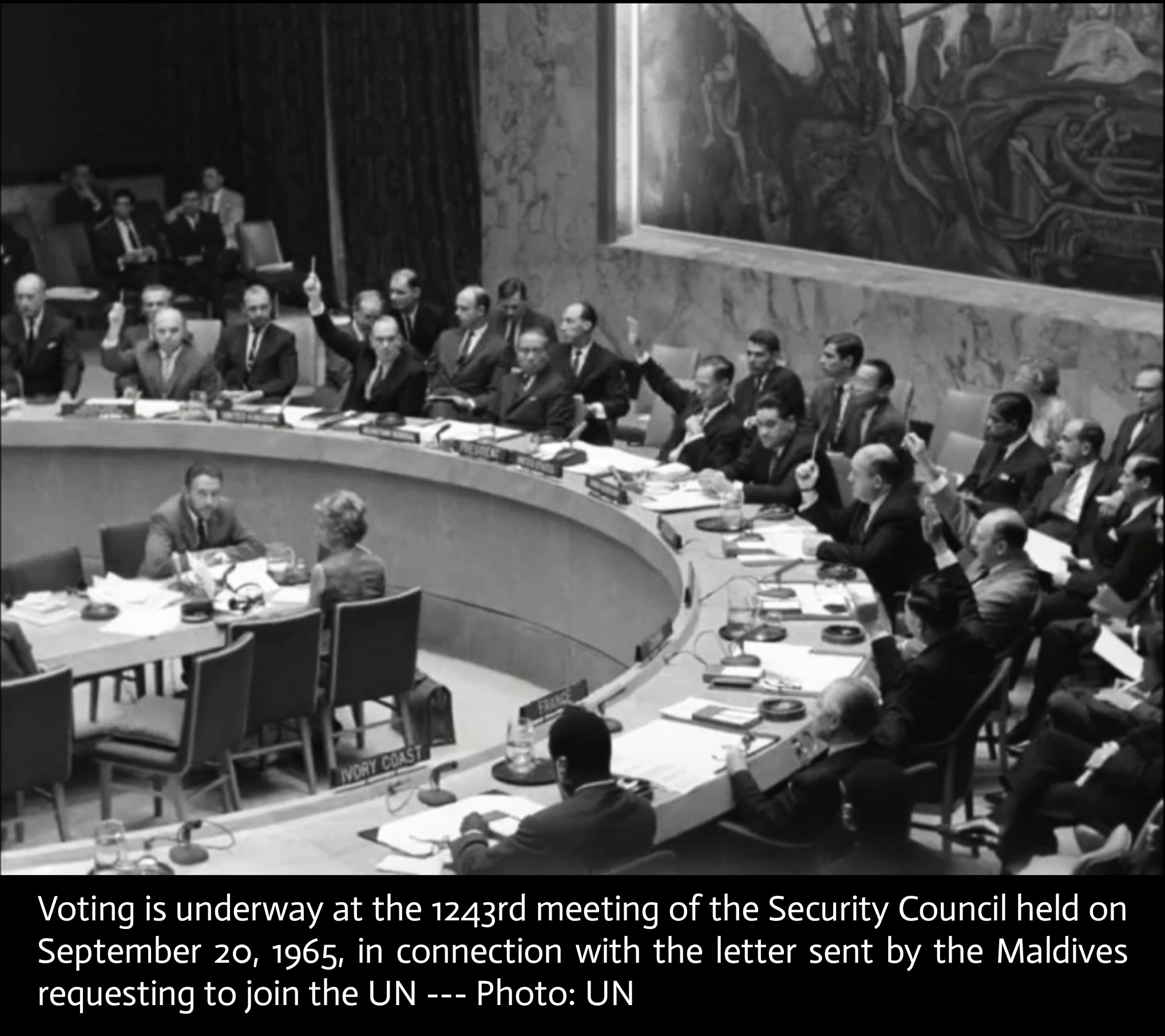
Subsequently, at the UN General Assembly meeting held on September 21, 1965, the Maldives was officially recognized as a member country of the UN. The official ceremony of raising the Maldivian flag at the UN headquarters in New York, USA, was held on October 12, 1965, with the Maldives represented by its first permanent representative to the UN, Ahmed Hilmy Didi, along with Abdul Sattar Moosa Didi and Kandi Ahmed Ismail. The UN was represented by Secretary-General U Thant.
Speaking at the ceremony held to raise the Maldivian flag at the UN headquarters, UN Secretary-General U Thant said that the fact that the Maldives is among the smallest countries in the UN in terms of population and land area does not diminish the importance of the ceremony. He also stated that the participation of a small country like the Maldives in the UN demonstrates that the UN's strength comes not only from the power and influence of large, powerful countries but also from the assistance and cooperation of small, less powerful nations. He added that this enhances the security and protection of small countries, and encourages larger countries to provide the necessary aid for the development and progress of smaller nations through the UN.
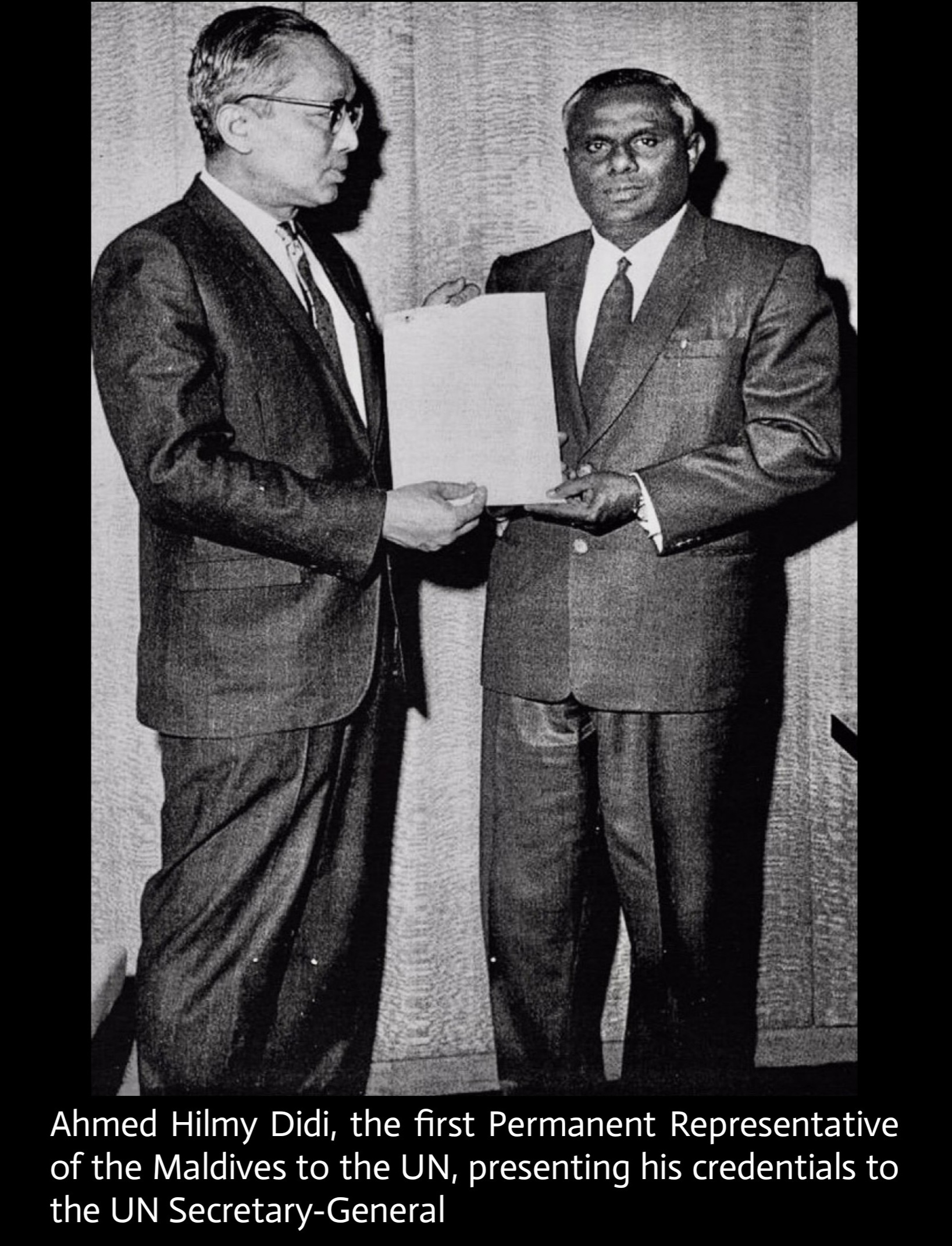
The Maldives, which became the first small country to join the United Nations on September 21, 1965, has established a number of models for other small states. It has advocated for the rights of small states and raised its voice on numerous occasions. The fact that a Maldivian presided over the 76th session of the United Nations General Assembly illustrates how the Maldives has worked in conformity with the UN Charter, as indicated in then-Prime Minister Ibrahim Nasir's letter upon entering the UN.
Maldivians have never accepted that the Maldives was a tributary state of Ceylon, nor was it ever the case. The tribute was an annual gift from the Maldives that had been given since Ceylon was under Dutch rule. Therefore, Mohamed Amin Didi, who was then in charge of the Maldivian government, decided to explain this misconception and fully halt the 'annual gift', which they deemed a "tribute," and establish the Maldives as an independent state. As a result, the British-Maldivian protection agreement was renewed. This event took place at Malé on April 24, 1948. The main purpose for stopping the annual gift was to clear up any confusion that had arisen, more for Ceylon than the British. And also, to prevent Ceylon from later claiming sovereignty over the Maldives. However, as I mentioned earlier, the Ceylonese continued to believe as previously stated. Evidence of this is that on March 8, 1957, Ceylon's Prime Minister Solomon Bandaranaike made a claim on the Maldives. In this claim, he also indicated that he would consult with the British to bring Ceylon's sovereign power over the Maldives. This story was also published in some newspapers at the time. Therefore, the treaty made on April 24, 1948, during the rule of Mohamed Amin Didi, was a very important step taken for the Maldives to exist as an independent sovereign state in the modern world.
Subsequently, on July 26, 1965, during the reign of Sultan Mohamed Fareed, Prime Minister Ibrahim Nasir's most significant achievement was transforming the country into a fully independent and sovereign nation, free from British protection. Although the independence agreement was signed on July 26, 1965, it is certain that this was the result of numerous efforts made long before. After emerging as an independent nation, the next major step taken to ensure the continuity of that independence was joining the United Nations, the largest international organization created for peace, friendship, and development among all countries of the world. On August 26, 1965, one month after independence, Prime Minister Ibrahim Nasir signed and sent a letter to the UN Secretary-General requesting membership in the United Nations. Along with this letter, he also submitted a document pledging to fully comply with the obligations of member states as per the UN Charter.

In connection with the letter sent by the Maldives requesting membership in the UN, the matter was placed on the agenda of the 1243rd meeting of the Security Council held on September 20, 1965, and discussions were held that day. On that day's agenda was also the issue of granting membership to Singapore, which is slightly larger than the Maldives but still considered among the small nations. At that time, the Maldives was the smallest country in all aspects that had applied for UN membership, referring to both population and land area. Three countries sponsored and submitted a resolution for the Maldivian application to join the UN. These were Jordan, Malaysia, and the United Kingdom.

In his speech that day, Lord CARADON, the British representative said:
"My country has had relations with the inhabitants of the Maldive Islands since the seventeenth century, and I am very glad today to sponsor the application of the new State of the Maldive Islands for membership in the United Nations. The population of the islands is just short of 100 000 people, and the widely scattered islands in the past have usually been remote from the main currents of world events. But, comparatively small in population and in total area as the Maldives are, the application now before us could not be supported by better qualifications.
The people of the Maldives are lovers of freedom who enjoy a democratic form of government. Their Sultanate, which is elective, dates from the twelfth century, when they were converted to Islam, and the island chronicles go back to 1141. Their Majlis is a parliament in which the inhabitants of all the islands are freely represented.
The long and close association between my country and the Maldives led to the final step in the development of those relations in an agreement concluded between the two Governments at Colombo, on 26 July 1965, under which my Government confirmed its recognition of the State of the Maldive Islands as a ‘composite sovereign and fully independent State possessing all rights to have direct relations politically and otherwise with all countries and international organizations.’
The relations of the Maldives with other States have been friendly, particularly with their nearest neighbour and chief trading partner, Ceylon, and as Moslems they have also maintained their links with the countries of Arabia.
On attaining full independence, the elected leaders of this new State, amongst their first acts, submitted the application of their State for admission to membership in the United Nations. This was the culmination of their aspirations and was accompanied by a declaration of their devotion to the principles of the Charter.
These are the qualifications - free government, full independence, friendly relations with all and a dedication to the aims and principles of the United Nations which justify the application before us, an application which, on behalf of my Government, I have the privilege to commend for your approval."
In his speech, the Jordanian representative Mr. SADI said:
"It is a great honour for my delegation to join the delegations of Malaysia and the United Kingdom in co-sponsoring a draft resolution recommending to the General Assembly that the Maldive Islands be admitted to membership in the United Nations, and also to join the delegations of the Ivory Coast, Malaysia and the United Kingdom in co-sponsoring another draft resolution recommending to the General Assembly that Singapore be admitted to membership in the United Nations.
My delegation considers it a privilege to be instrumental, even though in only & technical manner, in furthering universal representation in our inter- national Organization. It is always a sign of added strength and growth when the membership of the United Nations is on the rise.
While the Maldive Islands is relatively a small country in terms of population, it is indeed a great occasion to see its nationhood endorsed by membership in the United Nations. The people of my country share with the people of the Maldive Islands not only the same religion but a similar culture and language. It therefore gives my delegation particular pleasure today to have a part in the submission of the draft resolution so that our brethren may become Members of the United Nations in order that their voice may also be heard.
We feel certain that the General Assembly will unanimously approve the admission of these two nations. On behalf of my Government, I congratulate the two new nations on their forthcoming new status in our midst, and I pray that their participation in the United Nations will be crowned with productivity and success."

Mr. AKA, the Representative of the Ivory Coast said:
Among the pleasures and advantages attaching to membership of the Security Council, there are not only those of deliberating into the early hours on nights of tension, but also those of welcoming new States into the international community. The Ivory Coast, whose admission to the Security Council coincided with one of those rare moments when a large number of sovereign nations became independent, has already sponsored the admission of several States to the United Nations. It has always done so with enthusiasm and a sense of responsibility. It is a great pleasure for it to do so again in the case of Singapore and the Maldive Islands, whose applications the Security Council is called upon to consider today.
I believe that the smaller nations are, the more they need the United Nations. Consequently, Singapore and the Maldive Islands will naturally be bound, as Members of the United Nations, to co-operate with the Organization in bringing about the triumph of the ideals of peace and coexistence that we affirm and defend here."
Speaking at this Security Council meeting, the representative of the Republic of China (now Taiwan), Mr. HSUEH, said:
"The Security Council is today considering the applications for membership of two newly independent Asian countries. As an Asian country, China welcomes the applications of the Maldive Islands and Singapore. Though relatively small in land area and population, the two applicants are, in the view of my Government, fully qualified for membership in the United Nations. The Charter of the United Nations makes no distinction between countries, large and small. The very first principle of the Organization laid down in the Charter is the principle of the sovereign equality of all its Members.
The only conditions that govern the admission of new members are those set forth in Article 4 of the Charter. That Article limits membership to peace- loving States which accept the obligations contained in the Charter and are able and willing to carry out those obligations. In fact, these same conditions also govern the continuing membership of all present Members. In the view of my Government, both the Maldive Islands and Singapore meet these criteria.
The Maldive Islands are perhaps the smallest in size of all countries. This fact, however, has not made any weaker the will of the brave Maldive people to independence and freedom. Their early history contains a proud record of successful resistance against numerous attempts by outside forces to control them. Of their own free will, they once sought neighbourly protection from another country. And of their own free will, they have now achieved full independence. My Government already extended its warm congratulations and best wishes to the Maldive Government and people on that occasion.
Although limited in resources because of the size of their country, the Maldive people are known to be industrious. It is our hope and belief that they will continue to be successful in their work of nation- building and development. It is gratifying to know that the United Kingdom, with which the Maldive Islands have maintained close relations, has extended its helping hand in this regard. In admitting the Maldive Islands to its membership, the United Nations should also stand ready to be of assistance and to co-operate if the Maldive people so wish.
My delegation, therefore, has the honour, on behalf of the Chinese Government and people, to welcome both the Maldive Islands and Singapore to the United Nations. We wish them success as independent States and Members of the United Nations. Accordingly, my delegation will vote in favour of the draft resolutions recommending to the General Assembly that these States be admitted to member- ship in the United Nations.
Speaking at the UN Security Council meeting, Russian representative Mr. FEDERENKO said:
"The Security Council has before it today a declaration by the Prime Minister of the Maldive Islands, Mr. Ibrahim Nasir, applying for the admission of the Maldive Islands to membership in the United Nations, and a declaration by the Minister for Foreign Affairs of Singapore, Mr. S. Rajaratnam, applying for the admission of Singapore to membership in the United Nations.
In its declaration, which has been circulated to members of the Security Council, the Government of the Maldive Islands states that it accepts the obligations contained in the United Nations Charter and undertakes to fulfil them.
In welcoming the birth of a new independent State, the Soviet delegation expresses its satisfaction at the fact that on 26 July 1965 yet another dark page of colonial history was turned. On that day the courageous people of the Maldive Islands restored their country to freedom and political independence from foreign colonialist domination.
It is significant that the refreshing winds of liberation from colonial slavery have also begun to blow over small colonial territories with small populations. This demonstrates the glory and wisdom of the historic Declaration on the Granting of Independence to Colonial Countries and Peoples, the provisions of which are equally applicable to all colonial territories, both large and small, regardless of where they are situated in the world.
We know that freedom for the people of the Maldive Islands was not achieved at all easily. As in other cases, colonialism barred the way to its attainment. First there were the Portuguese colonialists who seized the Maldive Islands in the sixteenth century. Then the British "protectors" appeared on the Islands and were the arbiters of the Islands' fate for many decades.
These foreigners and their local henchmen kept the population of the Maldive Islands in darkness and ignorance for their own selfish ends. But ideas of national liberation continued to mature among the people. The glad tidings of victories over the colonialists in other countries reached the Islands' shores across the Indian Ocean and awakened thoughts of freedom in the minds of patriots.
However, it is clear that the political independence achieved by the Maldive Islands will not by itself eliminate all the problems or liquidate all the baneful consequences of colonialist domination. The people of the Maldive Islands, like all other peoples who have recently won their independence, are faced with the complex problems of liquidating the consequences of colonialism.
Political independence creates the conditions in which a people can itself decide the ways in which its country is to develop in the future.
On the day when the independence of the Maldive Islands was proclaimed, the Soviet Union sent greetings to this new State. The following is part of a cable from Mr. Kosygin, Chairman of the Council of Ministers of the USSR, to Mr. Ibrahim Nasir, Prime Minister of the Maldive Islands:
"On behalf of the people and Government of the Union of Soviet Socialist Republics, we congratulate the people and Government of the Maldive Islands, and you personally, on a significant event in the history of the Maldive people-the achievement of political independence. We wish the Maldive State every success in the consolidation of its independence."
The Soviet delegation also congratulates the Government and people of the Maldive Islands on attaining independence, supports the application of the Maldive Islands for admission to membership in the United Nations, and will vote in favour of recommending to the General Assembly that the Maldive Islands should be accepted as a Member of the United Nations."

Mr. SEYDOUX, the French representative said:
"The Maldive Islands have likewise applied for admission to membership in the United Nations. My delegation wishes to welcome that country's application; its entry into the United Nations will furnish the Members of our Organization with information, which perhaps all of us did not have to the same degree, concerning the special problems confronting a State of this kind. We hope that the Maldive Islands will be able to play the useful role which, for all of us, justifies our participation in the work of the Organization. In this spirit the French delegation will vote for the draft resolution submitted by Jordan, Malaysia and the United Kingdom."
Mr. VIDAL ZAGLIO the representative of Uruguay said:
"My Government has taken note of the two communications before the Council, one from the Prime Minister of the Maldive Islands, Mr. Ibrahim Nasir, and the other from the Minister for Foreign Affairs of Singapore, Mr. S. Rajaratnam, in which they request the admission of their countries to membership in the United Nations.
Uruguay is ready to vote in favour of the two draft resolutions, which are also before the Council, which will lead to the admission of these two new independent States to this Organization. Had we had an incomplete picture of what the Maldive Islands and Singapore represent in furthering the ideal of freedom, the eloquent words of the various preceding speakers would have sufficed to convince us of the necessity of supporting the two draft resolutions."
Mr. ORTIZ SANZ, the Bolivian representative said:
"To increase the membership of the United Nations, provided we are dealing with peoples who are ready to respect our Charter and to serve the ideals of world peace, means strengthening our Organization and improving and increasing the prospects for co-operation among nations. The Maldive Islands and Singapore can count upon Bolivia's enthusiastic support of their applications for membership in the United Nations. We are sure that these States will honour the commitments they assume with respect to the Charter and also fulfil their aspirations and exercise their rights as new nations pursuing the path of peace."
Malaysian representative Mr. RAMANI said:
"I asked for this second opportunity to address the Council so that I might associate my delegation and my Government with the felicitations and good wishes tendered to the new State of the Maldive Islands. I have no doubt that both the Maldive Islands and Singapore, on becoming Members of the United Nations, will play their proper role in helping to achieve and sustain the ideals of the Charter and will make significant contributions to the United Nations.
The representative from the United States of America and also the President of the Security Council Mr. CHARLES W. YOST said:
"The United States will also support the request of the Maldive Islands for membership in the United Nations. We have been gratified at the satisfactory outcome of the independence negotiations between the Maldive Islands and the United Kingdom, and welcome the Maldive Islands into the family of nations. Similarly, this independent nation is now preparing to move into the world arena, as evidenced by its application for United Nations membership.
We are confident that the Government of the Maldive Islands will continue to strive for the economic and social betterment of the people living throughout this island group in the same atmosphere of peace and freedom that has for so long characterized the management of its internal affairs. We are encouraged that so soon after achieving its independence the Government of the Maldive Islands has affirmed, by its application for membership, its own dedication to the goals and principles on which the United Nations is founded.
At the same time, while supporting the admission of the Maldive Islands to the United Nations, we cannot help but note in this connexion a basic problem which will confront the United Nations in the future. There are many small entities in the world today moving steadily towards some form of independence. We are in sympathy with their aspirations and applaud this development. However, the Charter provides that applicants for United Nations membership must be not only willing but also "able" to carry out their Charter obligations. The drafters of the Charter were not unmindful of the existence then of some very small States whose resources would simply not permit them to contribute to the work of the Organization, however much they might wish to do so. Today, many of the small emerging entities, however willing, probably do not have the human or economic resources at this stage to meet this secondary criterion.
After speaking as the representative of the United States, the President of the Security Council called for a vote on the resolution proposed by Jordan, Malaysia, and the United Kingdom for the Maldives to become a member of the UN. At the 1243rd meeting of the Security Council held on September 20, 1965, the resolution to make the Maldives a member country of the UN was passed unanimously by a show of hands from all member countries of the Security Council.

Subsequently, at the UN General Assembly meeting held on September 21, 1965, the Maldives was officially recognized as a member country of the UN. The official ceremony of raising the Maldivian flag at the UN headquarters in New York, USA, was held on October 12, 1965, with the Maldives represented by its first permanent representative to the UN, Ahmed Hilmy Didi, along with Abdul Sattar Moosa Didi and Kandi Ahmed Ismail. The UN was represented by Secretary-General U Thant.
Speaking at the ceremony held to raise the Maldivian flag at the UN headquarters, UN Secretary-General U Thant said that the fact that the Maldives is among the smallest countries in the UN in terms of population and land area does not diminish the importance of the ceremony. He also stated that the participation of a small country like the Maldives in the UN demonstrates that the UN's strength comes not only from the power and influence of large, powerful countries but also from the assistance and cooperation of small, less powerful nations. He added that this enhances the security and protection of small countries, and encourages larger countries to provide the necessary aid for the development and progress of smaller nations through the UN.

The Maldives, which became the first small country to join the United Nations on September 21, 1965, has established a number of models for other small states. It has advocated for the rights of small states and raised its voice on numerous occasions. The fact that a Maldivian presided over the 76th session of the United Nations General Assembly illustrates how the Maldives has worked in conformity with the UN Charter, as indicated in then-Prime Minister Ibrahim Nasir's letter upon entering the UN.





